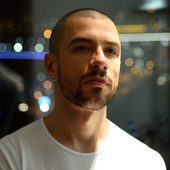
Marko Nikodijevic
The Music of Marko Nikodijevic
Marko Nikodijevic was born in 1980 in Subotica, Serbia, and studied between 1995 and 2003 in Belgrade with SrdjanHofman and Zoran Eric´. Postgraduate studies with Marco Stroppa took him to Stuttgart’s HochschulefürMusik und darstellendeKunst, and he has remained in Germany, making his home in Stuttgart while also holding residencies and scholarships in Weimar, Salzwedel and Baden-Baden. The latest in this series of prestigious stipends allowed him to spend part of the year 2012–2013 in Paris as a resident scholar at the Cité internationale des Arts.
The fundamental concerns of his music became evident early: the exploration of fractal structures; the extensive use of digital technology in pre-composition (and, increasingly, in performance); an attitude to style which simultaneously involved him with and distanced him from the music of the past. The ensemble work music box / selbstportraitmit ligeti und strawinsky (und messiaen ist auch dabei) – written when Nikodijevic was just twenty, and strikingly assured even before the characteristic later finessing of both detail and large-scale form – presents musical quotation and allusion as a sort of trompe-l’oreille effect, a by-product of the manipulation of computer algorithms. Subjectivity arises as a side-effect of quasi-automatic process.
Questions of process and subjectivity continue to resound through much of Nikodijevic’s subsequent output. Many works draw their material in part or entirely from existing music – usually a single piece by another composer, compressed and stretched by means of computer analysis and surrounded with the resonant halo of Nikodijevic’s always sophisticatedly sensuous orchestration. The resulting music is often as different from the source work as Nikodijevic’s pieces are from one another. Indeed, both the use of the computer as a compositional tool and the employment of other music as source material are on one level designed to ensure precisely this avoidance of stylistic habits within his own work. Yet the music flirts constantly with expressivity, and perhaps it is significant that the figures to whom Nikodijevic has turned most frequently for his source material are two composers – Carlo Gesualdo and Claude Vivier – whose work’s reception is marked by an excess of biography. Thus dramatising by implication the lives of others, the music finds its voice around these other voices. They press in on Nikodijevic’s own. He speaks through them, or they through him.
Within and around the remarkable variety of utterance we can perceive a formidably coherent oeuvre taking shape, that of a musical personality which is present in the finest orchestrational detail as much as in larger questions of attitude: perhaps above all, the willingness to mix high technical sophistication with an almost defiant sentimentality. (The ‘seagull’ glissandi which appear in the strings towards the end of many pieces combine the sophistication and the sentimentality in what is already for Nikodijevic a trademark gesture.) Several works build on the extremely fast music that characterises much of music box ..., pushing it further towards the sound-worlds of techno and dance music – as in parts of chambres de ténèbres / tombeau de claude vivier, a sort of ecstatically dark ensemble fantasy, or even more especially in the orchestral piece GHB/tanzaggregat (which was premiered in December 2011 by the Radio-Sinfonieorchester Stuttgart). The prominent use of electronica in the chamber work grid/index
emphasises the programmatic aspect of this encounter with techno-aesthetics, but even the purely instrumental works powerfully evoke the nightclub as both an expressive and a physical space, made tangible through the spatial simulation that digital technology enables.
A contrasting group of works – memorials or, as one unusual generic designation has it, a ‘consolation’ – seems instead to explore church-like spaces (the designation of other pieces as ‘motet’ and ‘antiphon’ might confirm this impression). The sound-world here is one of intense slowness: the composer has even spoken, in connection with sadness/untitled and gesualdo abschrift/antiphon super o vos omnes, of ‘sonic sculpture’ rather than music. The orchestral piece cvetic, kucica…/la lugubre gondola draws this suspended resonance into an underwater echo-chamber: subjectivity is again mediated through transcription, in this case of Liszt’s famous piano piece, but the result now is an intensely moving act of mourning, a ‘funeral gondola’ in sound which picks up echoes of other musics – of the barcarolle, of Sibelius’s Swan of Tuonela, of a whole history of orchestral lamentation – on the way to its watery resting-place.
cvetic, kucica... was awarded the 2010 Gaudeamus Prize, after previous honourable mentions for this composer in Gaudeamus Music Week in 2003 and 2007. grid/index and gesualdo abschrift... were composed and premiered under the auspices of the International Ensemble Modern Academy’s 2010–2011 master’s degree programme.
Nikodijevic’s music has also benefited from the support of performers including the Ives Ensemble, Nieuw Ensemble, Ensemble Modern, Nouvel Ensemble Moderne, Ensemble Insomnio, Brandenburger Symphoniker, Holland Symfonia, ORF Radio-Symphonieorchester Wien, Mahler Chamber Orchestra, London Philharmonic Orchestra, the conductors Michael Helmrath, Reinbert de Leeuw, Johannes Kalitzke, Jonathan Stockhammer or Vladimir Jurowski and the pianist John Snijders, and has been heard at the Steirischer Herbst, Huddersfield, Warsaw Autumn, Musica Strasbourg and MATA (New York) festivals, as well as at the 2006 World New Music Days in Stuttgart and the 2009 Unesco Rostrum of Composers. Further premieres took place in 2012 for both the Witten New Music Days and the Donaueschingen Festival. The world premiere of the opera VIVIER. A Night Protocol (libretto by Gunther Geltinger) was given during the course of the 2014 Munich Biennale in a co-production with the Braunschweig State Theatre.
In 2013 Marko Nikodijevic received one of the three composition furtherance prizes of the Ernst von Siemens Music Foundation and in 2014 was awarded the DeutscherMusikautorenpreis (German Composers‘ Prize) in the category of furtherance of young talent.
John Fallas, June 2014
